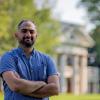Smart Cities
Enabling communities to improve built infrastructure and resources through cyber technologies.

Many of the systems that civil and environmental engineers design, build, and maintain are going through a revolution involving the adoption of technological advances. These advances include the Internet of Things for real-time and ubiquitous sensing, computer control and automation to create adaptive and cyber-physical infrastructure systems, virtual and augmented reality for creating digital twins, and new machine learning and artificial intelligence approaches for simulation and prediction.
Smart cities approaches that take advance of these technological advances include creating more adaptive infrastructure systems, such as smart buildings, smart roads, or smart stormwater systems, which adapt to current or future conditions. There are unique challenges associated with bringing these technical advances to cities and communities, including ensuring the adoption of technology is trusted by residents and does not become an instrument for harm through surveillance or bias. Across all civil and environmental engineering subfields, our department is working to advance technology for the public’s best interests so it can best serve societal needs while also limiting harmful impacts.
CEE Faculty in Smart Cities

Negin Alemazkoor

T. Donna Chen
Dr. Chen joined the Department of Civil and Environmental Engineering at the University of Virginia in August 2015.

Teresa B. Culver
My lifelong love for the outdoors translated directly into the study of environmental and water resource engineering. At UVa, I have the honor of working with a new generation of engineers who will work to create a sustainable future.

Diana Franco Duran
Diana Franco Duran is an Assistant Professor in the Department of Civil and Environmental Engineering. She is the director of the Civil Engineering Undergraduate Program, and manages the Construction Engineering and Management (CEM) concentration.

Jose Pantaleon Gomez III
Jose Gomez was recently the Director of Research for the Virginia Transportation Research Council, the Virginia Department of Transportation’s research division until he retired in 2016. Highlights from his career include co-Principal Investigator on 16 external grants totaling over $5.4 million in research and co-author of 42 research reports.

Jonathan L. Goodall
Jon Goodall is a Professor of Civil and Environmental Engineering and Director of the UVA Engineering Link Lab. He is a water resources engineer working to advance the field of hydroinformatics where data and computational sciences are used to improve the understanding, forecasting, and management of water systems.

Devin K. Harris
Professor Harris is chair of the Department of Civil and Environmental Engineering at the University of Virginia. His research and teaching interests focus on large scale infrastructure systems with a primary focus on condition monitoring and system performance.

Arsalan Heydarian
Arsalan Heydarian is an Associate Professor in the Department of Civil and Environmental Engineering as well as the UVA Link Lab. His research broadly focuses on user-centered design, construction, and operation of intelligent infrastructure with the objective of enhancing their sustainability, adaptability, and resilience.

Leidy Klotz
Leidy Klotz studies and writes about design and problem-solving. He has published two books (with a third in press), over 80 peer-reviewed articles in scientific journals including Nature and Science, and numerous articles in publications such as The Washington Post, Harvard Business Review, Fast Company, and Scientific American.

Venkataraman Lakshmi
Venkat's areas of research interest are catchment hydrology, satellite data validation and assimilation, field experiments, land-atmosphere interactions, satellite data downscaling, vadose zone and water resources.

James H. Lambert

Osman E. Ozbulut
Osman Ozbulut is a Professor in the Department of Civil and Environmental Engineering at the University of Virginia.

B. Brian Park
Brian Park is a Professor in the Department of Civil and Environmental Engineering and the Department of Systems and Information Engineering at the University of Virginia. His research focuses on improving the efficiency of surface transportation systems via connected automated vehicle controls, traffic operations and management strategies.

Lisa Colosi Peterson
Lisa Colosi Peterson is a professor in the departments of Civil and Environmental Engineering (CEE) and Systems and Information Engineering (SIE) (by courtesy) as well as director of the UVA Life Cycle Assessment (LCA) Lab.

Julianne Quinn
Quinn's research focuses on optimization and simulation methods used to inform the design and management of water resources systems with the goals of protecting people from nature (floods and droughts), and nature from people (pollution and consumption). She is interested in how advanced sensing and forecasting techniques inform this optimization.

Majid Shafiee-Jood
Majid Shafiee-Jood is a Research Assistant Professor in the Department of Civil and Environmental Engineering and the Department of Systems and Information Engineering at the University of Virginia.

Brian L. Smith, PE
Brian L. Smith, PE is a leader in advanced technology in surface transportation systems - specifically "connecting" the infrastructure to travelers to improve transportation safety and efficiency. His research has contributed to innovations such as mobile phone navigation systems and urban freeway management.

